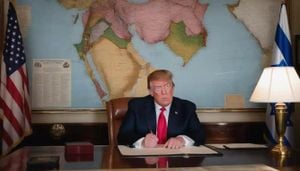Donald Trump's unexpected decision not to include two well-known former officials from his initial administration—Nikki Haley and Mike Pompeo—in his upcoming cabinet was announced on Saturday, stirring discussions across political circles.
Haley, who served as Trump's ambassador to the United Nations, and Pompeo, who was the secretary of state, had been seen as likely candidates to return to high-ranking positions. "I will not be inviting former Ambassador Nikki Haley, or former Secretary of State Mike Pompeo, to join the Trump Administration, which is currently in formation," the President-elect stated on his social media platform, Truth Social. He expressed gratitude for their past contributions, adding, "I very much enjoyed and appreciated working with them previously, and would like to thank them for their service to our country."
Following the announcement, Haley, who endorsed Trump after initially critiquing him during the Republican primaries, reflected positively on their past collaboration and wished him success. She tweeted, "I was proud to work with President Trump defending America at the United Nations. I wish him, and all who serve, great success in moving us forward to a stronger, safer America over the next four years."
Pompeo, who was previously poised to be part of Trump's second term, had indicated he would accept another position under Trump if it arose. "I don’t often comment on jobs I’ve not been offered," he had noted back in March. "But if I get a chance to serve and think I can make a difference, I’m almost certainly going to say yes to try and deliver on behalf of the American people." After Trump's latest announcement, Pompeo was reportedly unavailable for immediate comments, leaving many to speculate about the nature of their professional relationships.
This surprise decision aligns with Trump's approach to staffing, as he prioritizes candidates who have displayed loyalty to his brand of Republicanism, known colloquially as MAGA (Make America Great Again). According to insider reports, many expect Trump’s new administration will be filled predominantly with those who have steadfastly supported him, sidelining those like Haley and Pompeo, who may have previously expressed dissent.
Speculation about potential roles for Haley and Pompeo circulated widely after Trump's November 5 election victory. During his campaign, Trump had even suggested Haley could play some role within his second administration. Similarly, there was widespread talk of Pompeo potentially filling a key defense position, but that's now off the table.
Interestingly, Trump's administration currently appears to be taking shape with Susie Wiles, his campaign manager, stepping up as chief of staff. This appointment marks her as the first woman to hold this significant post within the White House, showcasing Trump’s intentions to make notable choices among his new team.
Throughout his campaign, Trump was vocal about his ability to end conflicts like the war in Ukraine swiftly, which seemed directly at odds with Pompeo's more militaristic foreign policy proposals during his tenure. Trump's assertion about resolving international disputes rapidly has raised eyebrows, especially amid rising tensions globally, and his seeming dismissal of seasoned diplomats might distance him from traditional Republican foreign policy perspectives.
Pompeo, for his part, quietly criticized aspects of Trump's approach post-presidency, hinting at fiscal and foreign policy differences. Meanwhile, Haley earned notable attention for her opinions during the primary, where at times she directly challenged Trump's strategies, causing rifts yet later pledging her support as they moved forward.
The tension between Trump and his former officials has contributed to shifting dynamics within Republican ranks, where loyalty is increasingly being tested against past disagreements and criticisms. This incident may reflect broader themes of consolidation of power within Trump's camp as he gears up for another four years, shaping the party's future.
Overall, Trump's choice to exclude both Haley and Pompeo from his new term showcases the delicate balance of loyalty, past grievances, and the desire for continuity as the political climate shifts heading toward the inauguration. Stakeholders within the party will be watching closely to see whom he chooses to fill these pivotal positions as they shape America's future.
The ratifications and appointments within Trump's administration will likely serve as indicators of his governing style, priorities, and how he views his past coalitions—an aspect many analysts will keep close tabs on as we move forward.



